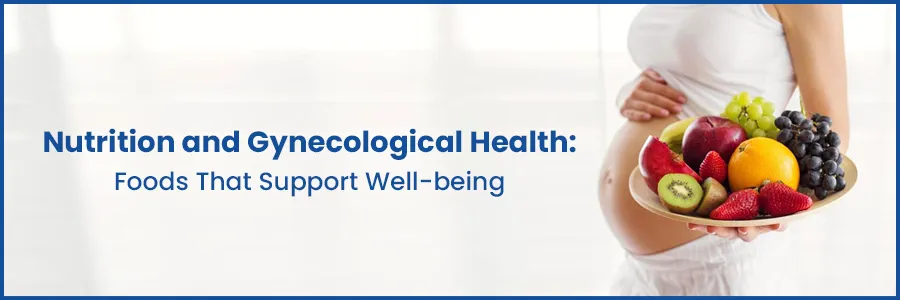- Cardiology 84
- Dermatology 45
- Endocrinology 33
- ENT 16
- Fertility 190
- Gastroenterology 78
- General-Medicine 81
- Gynecology 80
- Hematology 19
- Infectious-Diseases 33
- Neurology 52
- Oncology 34
- Ophthalmology 23
- Orthopedics 69
- Pediatrics 31
- Procedure 23
- Public-Health 144
- Pulmonology 59
- Radiology 8
- Urology 68
- Wellness 161
- Woman-and-child 77

Nutrition for Women's Gynecological Health
As women, our bodies undergo unique hormonal fluctuations throughout our lives, from menstruation and pregnancy to menopause. Nurturing our gynecological health becomes paramount during these transitions, and one powerful way to achieve this is through a well-balanced and nourishing diet. In this blog, we explore the crucial connection between nutrition and gynaecological well-being, delving into the foods that can support our hormonal balance, reproductive health, and overall vitality.
Secure your health with a second opinion. Make informed decisions and book your appointment today!
Get A Second OpinionBest Foods for Women’s Reproductive Health
Omega-3 Fatty Acids: The Hormonal Harmonizers: Discover how key essentials omega-3 fatty acids found in fatty fish, chia seeds, and flaxseeds can help regulate hormones and reduce inflammation, benefiting menstrual health and supporting fertility.
- Vibrant Veggies for Vitality: Explore a rainbow of vegetables, from leafy greens like spinach and kale to cruciferous wonders like broccoli and cauliflower. These nutrient-packed veggies provide essential vitamins and minerals, fostering optimal reproductive health.
- Powerful Plant-Based Proteins: Learn about the importance of plant-based protein sources such as lentils, beans, quinoa, and tofu in maintaining hormone balance and supporting reproductive health.
- Gut Health and Hormones: The Probiotic Connection: Uncover the fascinating link between gut health and hormonal regulation. Probiotic-rich foods like yoghurt, kefir, and fermented vegetables can positively impact gynaecological well-being.
- Superfoods for Gynecological Health: Explore the superstars of nutrition, including berries, nuts, seeds, and avocados. These superfoods are rich in antioxidants, healthy fats, and vitamins that promote overall well-being.
Nutrition Need for Pregnant Women
- Nutrition for Menstrual Health: Learn how to ease menstrual disorders and support regular cycles with a diet rich in iron, magnesium, and B vitamins
- Pregnancy Nutrition for the Mother and the Baby: Discover the critical nutrients needed during pregnancy, including folic acid, calcium, and iron, and their role in fostering a healthy pregnancy and baby.
- Postpartum Nutrition: Replenishing After Birth: Explore the nutritional requirements for postpartum recovery and breastfeeding, with a focus on energy-boosting foods and essential nutrients.
- Perimenopause and Menopause: The Nutrition Connection: Navigate the changes that may occur during perimenopause and menopause, and explore how a well-balanced diet can help manage symptoms and support bone health.
Ready to take control of your health journey? Book your appointment now and start your path towards wellness today!
Book an AppointmentNutrition for women's health
- Fertility-Boosting Foods and Nutrients: Discover specific nutrients, such as zinc, selenium, and vitamin D, that play a crucial role in supporting fertility and optimizing reproductive health.
- The Impact of Sugar and Processed Foods on Hormones: Understand how excessive sugar and processed food consumption can disrupt hormonal balance and negatively impact gynaecological health.
Nutrition, Lifestyle, and Well-being of a Women
- Mindful Eating for Hormonal Balance: Embrace mindful eating practices to promote hormonal balance, reduce stress, and foster overall gynaecological health.
- Balancing Exercise and Nutrition: Explore the benefits of regular physical activities in conjunction with a nourishing diet to support gynecological health.
Conclusion
Nutrition forms the foundation of our well-being, and its impact on gynaecological health is profound. By incorporating these nourishing foods into our diets and making conscious lifestyle choices, we can empower ourselves to navigate each life stage with resilience and vitality. Remember, small changes in nutrition can lead to significant improvements in gynaecological health, making it a rewarding journey of self-care and well-being from within.
Frequently Asked Questions
Nutrition plays a crucial role in hormonal balance, menstrual health, fertility, and overall well-being. A proper balanced diet which is rich in essential nutrients supports healthy reproductive functions and helps manage gynecological conditions.
Key nutrients include omega-3 fatty acids, iron, calcium, vitamin D, B vitamins, and antioxidants. These nutrients support hormone regulation, menstrual cycles, bone health, and fertility.
Yes, certain foods like leafy greens, berries, nuts, seeds, and whole grains are rich in fertility-boosting nutrients. A well-balanced diet can positively impact reproductive health and increase chances of conception.
Yes, certain foods like soy, flaxseeds, and foods which are rich in calcium and vitamin D can help manage menopausal symptoms such as hot flashes and bone density loss.
Yes, foods rich in magnesium, B vitamins, and healthy fats can help ease menstrual discomfort by reducing inflammation and supporting hormone balance.
A healthy gut microbiome is linked to hormonal regulation and immune function. Probiotic-rich foods promote a balanced gut microbiome, positively impacting gynecological health.
Processed foods high in sugar and unhealthy fats can disrupt hormonal balance. Limiting their consumption can contribute to improved gynecological well-being.
Yes, practicing mindful eating can reduce stress and promote hormonal balance. Eating mindfully encourages better digestion and absorption of nutrients.

- Cardiology 2132
- Dermatology 168
- Endocrinology 135
- ENT 97
- Fertility 217
- Gastroenterology 232
- General 478
- General-Medicine 1685
- Gynecology 169
- Hematology 85
- Infectious-Diseases 208
- Neurology 207
- Oncology 345
- Ophthalmology 65
- Orthopedics 187
- Pediatrics 83
- Procedure 72
- Public-Health 209
- Pulmonology 126
- Radiology 13
- Second Opinion 311
- Urology 294
- Wellness 600
- Woman-and-child 447
Related Blogs
If you have any questions, please fill out the enquiry form or call us, and we will get back to you promptly.
040-68334455